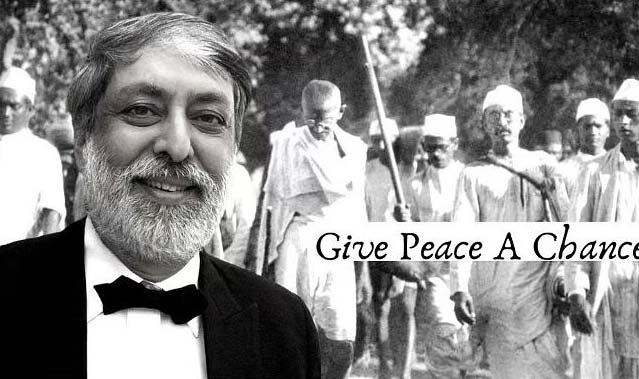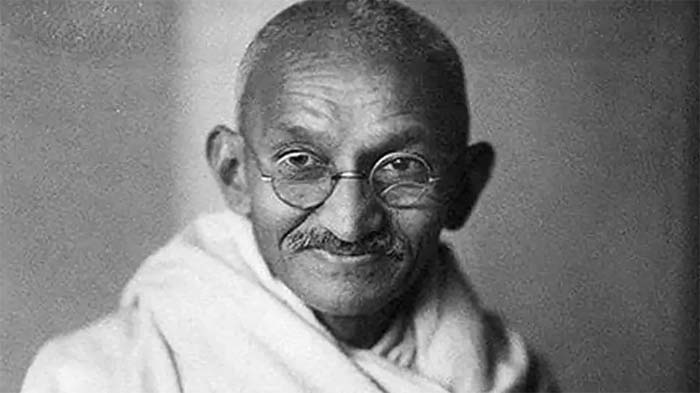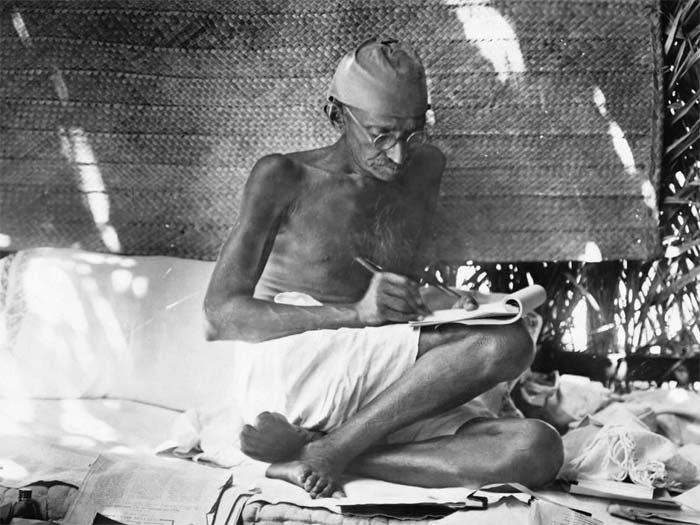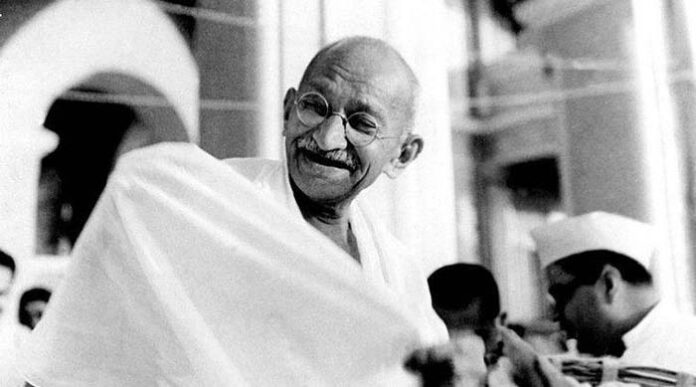We just held vardhanti of Mahatma Gandhi on January 30 and paid tributes yet again for 73 rd time. But we also specially remember Gandhi a couple of times in a year as on January 26, August 25, November 26. Of course, political leaders in power and outside refer to Mahatma Gandhi and pay tributes many more times as often as possible. What has been the influence of all that on the life styles of people, on public behaviour, on the functioning of political parties, on our public policies? And on citizenship and civil society?
Ramesh Sharma’s ‘Ahimsa’
“Ahimsa” documentary film by India’s eminent film producer, Ramesh sharma, is an amazing reminder of the influence of mahatma Gandhi in half a dozen countries. The film reminds relevance of Gandhi’s non-violent activism and the power of powerless. No wonder why Ahimsa was acclaimed at the United Nations when it was previewed a year ago. This film deserves universal screening the same way as the Attenborough’s Gandhi Film was done more than three decades ago. Also, since Luis Fisher’s book on Mohanchand karamchand Gandhi around 1940s, books on Gandhi continue to pour in year after year. We also commemorated (2019-20) yearlong 150th birth anniversary of Mahatma Gandhi with country wide events. Yet, what has been the difference all these celebrations have made on the psyche, thinking, policies and practices in India? Isolated instances were subdued by too many countervailing factors.

As a Fellow (1966) at Upland School of Social Change, Chester, outskirts of Philadelphia, founded by Dr Martin Luther King, jr., (later it was named after him)’ I saw how passionately Mahatma Gandhi was studied abroad and his methods were adopted in different contexts. Until recently, I do not know any institute in India at any level pursuing and experimenting with Gandhian ideas. Having structured and formal lessons on Gandhi is not same as deliberating and researching the scope and methodologies of non violence, decentralisation, or linkage of lifestyle phenomena with larger change. Also, I am not aware of any serious efforts to focus on any of the core attributes of Gandhi and their adoption or practical wisdom.
Also Read : GANDHIJI :A True Revolutionary, a Radical Thinker
Impact of Gandhi message?
That mahatma Gandhi’s messages are powerful not only politically but in most other fields and contexts as they are widely referred and revered. These include Gandhi s foresight then about emerging public economics and functioning of political parties. His emphasis on personal living and individual life styles as essential precondition for societal changes and reforms to accomplish universal values and goals should not be lost sight of although they are reiterated often. But by whom and with what credentials? Mohan chand Gandhi accomplished all that he was attributed in a matter of 20-25 years (1920-45). Since then, we have been talking and celebrating Gandhi for almost 75 years. I had the privilege of honouring in 2007 almost the last batch of 22 Gandhians in Vijayawada campus of Freedom Fighters, including my father. But what difference all that had made? Have we ever objectively assessed? Revival of Godse (killer of Gandhi) should not become a route to keep up Gandhi s legacy!

What Gandhi hoped did not happen
Considered opinion of many in this regard is that the much expected change has not come in socio-economic thinking or in lifestyles of individuals as Gandhi hoped. Perhaps because we never cared or were serious of the Gandhian ideals and his foresight beyond talking about them. As for example about political parties, or on minimalistic life style or on essentiality of decentralisation in governance. Even more, the values in public life that Gandhi insisted are missing today. He advocated means as important as the outcome. In fact, means mattered more for Gandhi and his experiments were mostly on that aspect. He believed and practised and that was how he could make the difference in just 20-25 years with no mass media around at the time. In 75 years after Gandhi, with mass media and their proliferation, have we made any difference? On the other hand, much could be said on the contrary. Because values are ignored. Values which go into good-bad consequences with concern for effects and sustainability have been lost sight of.

Gandhian fundamentals
Relevance of Mahatma Gandhi’s thoughts, lessons and foresight is in the context of individuals as well as in the context of public services and behaviours and it has to do with the fundamentals of survival and sustainability of the Republic. He specifically advocated dangers to human virtues in seven different contexts and services. Do we remember them? The seven are:
Also Read : Nation pays homage to Gandhi with False Sedition cases & Violent Attacks on Satyagraha
1) Wealth without work
2) Pleasure without conscience
3) Science without humanity
4) Knowledge without character
5) Politics without principles
6) Commerce without morality
7) Worship without sacrifice
At the outset of 150 year celebrations of Gandhi, I suggested in 2019 five attributes which surpass Gandhian preachings and which constitute the core values of individual lifestyle he practiced and preached. These five include:
1) Time discipline
2) Knowing about need and greed
3) Respect Nature, the five elements
4) Clarity in thinking and talking, preaching and practice
5) Sensitivity about selfishness and social responsibilities
Fundamentals of mahatma Gandhi include several policy implications. I venture to remind and sum up nine of these which continue to be relevant.Together, these constitute Gandhian model of economics and development. The nine fundamentals which need revisit are.

1. Gram swaraj: The idea of Village Republic. Instead, we reduced villages over these 70 years into colonies of govt. Instead of one or two functionaries, villages today in some states are ruled locally by five or six govt. functionaries
2. Decentralisation: This was expected in every respect. Instead, we have taken to centralisation in every respect as a virtue and strategy all across.
3. “We, the people” was the basis for our constitution. But it has been reduced into “we, the political parties” despite parties having no locus standi in the constitution initially.
4. Active Citizen and civic society centric and as best bet for democracy has been reduced into citizens’ dependence on govt. for everything and they became victims of doles in the name of welfare and representation.
5 Representative govt. has now become least representative and less reflective of public cause with elections becoming least to do with the means.
6. Checks and balances principle inherent has been converted into control and command concern of political parties.
7. Basic education and primary education lost its direction contributing to inequalities, selfish outlook and narrow perspective of generations.
8. The power of powerless which Gandhi believed and demonstrated has been reduced into a minority-majority dilemma ignoring in the process the idea of Trusteeship.
9. Corruption free public services was expected but we ended up as crippled WITH corruption all across.
Also Read : Ambedkar-Gandhi row on Dalit issues
21 criteria in all
If mahatma Gandhi made any difference, it should be evident on these twenty one (5+7+9) criteria. It should reflect in the context of as many of these attributes of Gandhi’s thought, preachings and insights. A discussion with some independent and non-political well informed persons in the last one year gives the impression that Gandhi made no difference at macro or micro levels of Indian scene. And this is because we have reduced Gandhi, like Mahatma Gandhi roads have been reduced to “MG Road” , into statues, divas or ritual events. Also, political leaders particularly those associated with govt. powers, tend to consider themselves as some kind of copyright holders of Gandhi. Children and schools have not taken to Mahatma Gandhi’s lessons and idea to do with lifestyle and not grasped significance of the ideas like “minimalist living” and its linkage with decline in governance, environment and development. Yoga has become a national trait and spirit not because of a govt. or political leaders. Can we expect to accomplish our cherished goals without addressing the basic issues, like the twenty one attributes given as examples here? It is time to think beyond keeping the legacy of Mahatma Gandhi formally and politically!
Dr Bhaskara Rao is an author of several books on good governance, democracy and development and a New Delhi based public policy analyst. He hails from an activist freedom fighter family.




